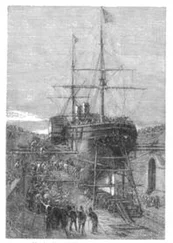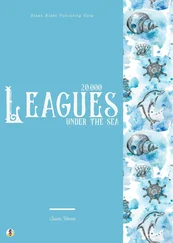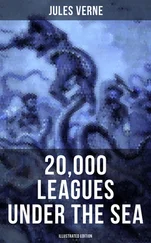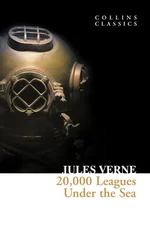Jules Verne - Twenty Thousand Leagues Under the Sea
Здесь есть возможность читать онлайн «Jules Verne - Twenty Thousand Leagues Under the Sea» — ознакомительный отрывок электронной книги совершенно бесплатно, а после прочтения отрывка купить полную версию. В некоторых случаях можно слушать аудио, скачать через торрент в формате fb2 и присутствует краткое содержание. Жанр: sf_writing, на английском языке. Описание произведения, (предисловие) а так же отзывы посетителей доступны на портале библиотеки ЛибКат.
- Название:Twenty Thousand Leagues Under the Sea
- Автор:
- Жанр:
- Год:неизвестен
- ISBN:нет данных
- Рейтинг книги:5 / 5. Голосов: 2
-
Избранное:Добавить в избранное
- Отзывы:
-
Ваша оценка:
- 100
- 1
- 2
- 3
- 4
- 5
Twenty Thousand Leagues Under the Sea: краткое содержание, описание и аннотация
Предлагаем к чтению аннотацию, описание, краткое содержание или предисловие (зависит от того, что написал сам автор книги «Twenty Thousand Leagues Under the Sea»). Если вы не нашли необходимую информацию о книге — напишите в комментариях, мы постараемся отыскать её.
Twenty Thousand Leagues Under the Sea — читать онлайн ознакомительный отрывок
Ниже представлен текст книги, разбитый по страницам. Система сохранения места последней прочитанной страницы, позволяет с удобством читать онлайн бесплатно книгу «Twenty Thousand Leagues Under the Sea», без необходимости каждый раз заново искать на чём Вы остановились. Поставьте закладку, и сможете в любой момент перейти на страницу, на которой закончили чтение.
Интервал:
Закладка:
"These creatures are not dangerous?" asked Conseil.
"No; not unless you attack them. When they have to defend their young, their rage is terrible, and it is not uncommon for them to break the fishing-boats to pieces."
"They are quite right," said Conseil.
"I do not say they are not."
Two miles further on we were stopped by the promontory which shelters the bay from the southerly winds. Beyond it we heard loud bellowings such as a troop of ruminants would produce.
"Good!" said Conseil. "A concert of bulls!"
"No; a concert of morses."
"They are fighting!"
"They are either fighting or playing."
We now began to climb the blackish rocks, amid unforeseen stumbles, and over stones which the ice made slippery. More than once I rolled over, at the expense of my loins. Conseil, more prudent or more steady, did not stumble, and helped me up, saying:
"If, sir, you would have the kindness to take wider steps, you would preserve your equilibrium better."
Arrived at the upper ridge of the promontory, I saw a vast white plain covered with morses. They were playing among themselves, and what we heard were bellowings of pleasure, not of anger.
As I passed near these curious animals, I could examine them leisurely, for they did not move. Their skins were thick and rugged, of a yellowish tint, approaching to red; their hair was short and scant. Some of them were four yards and a quarter long. Quieter and less timid than their congeners of the north, they did not, like them, place sentinels round the outskirts of their encampment. After examining this city of morses, I began to think of returning. It was eleven o'clock, and if Captain Nemo found the conditions favorable for observations, I wished to be present at the operation. We followed a narrow pathway running along the summit of the steep shore. At half-past eleven we had reached the place where we landed. The boat had run aground bringing the captain. I saw him standing on a block of basalt, his instruments near him, his eyes fixed on the northern horizon, near which the sun was then describing a lengthened curve. I took my place beside him, and waited without speaking. Noon arrived, and, as before, the sun did not appear. It was a fatality. Observations were still wanting. If not accomplished to-morrow, we must give up all idea of taking any. We were indeed exactly at the 20th of March. To-morrow, the 21st, would be the equinox: the sun would disappear behind the horizon for six months, and with its disappearance the long polar night would begin. Since the September equinox it had emerged from the northern horizon, rising by lengthened spirals up to the 21st of December. At this period, the summer solstice of the northern regions, it had begun to descend, and to-morrow was to shed its last rays upon them. I communicated my fears and observations to Captain Nemo.
"You are right, M. Aronnax," said he; "if to-morrow I cannot take the altitude of the sun, I shall not be able to do it for six months. But precisely because chance has led me into these seas on the 21st of March, my bearings will be easy to take, if at twelve we can see the sun."
"Why, captain?"
"Because then the orb of day describes such lengthened curves, that it is difficult to measure exactly its height above the horizon, and grave errors may be made with instruments."
"What will you do then?"
"I shall only use my chronometer," replied Captain Nemo. "If to-morrow, the 21st of March, the disk of the sun, allowing for refraction, is exactly cut by the northern horizon, it will show that I am at the South Pole."
"Just so," said I. "But this statement is not mathematically correct, because the equinox does not necessarily begin at noon."
"Very likely, sir; but the error will not be a hundred yards, and we do not want more. Till to-morrow then!"
Captain Nemo returned on board. Conseil and I remained to survey the shore, observing and studying until five o'clock. Then I went to bed, not, however, without invoking, like the Indian, the favor of the radiant orb. The next day, the 21st of March, at five in the morning, I mounted the platform. I found Captain Nemo there.
"The weather is lightening a little," said he. "I have some hope. After breakfast we will go on shore, and choose a post for observation."
That point settled, I sought Ned Land. I wanted to take him with me. But the obstinate Canadian refused, and I saw that his taciturnity and his bad humor grew day by day. After all I was not sorry for his obstinacy under the circumstances. Indeed, there were too many seals on shore, and we ought not to lay such temptations in this unreflecting fisherman's way. Breakfast over, we went on shore. The Nautilus had gone some miles further up in the night. It was a whole league from the coast, above which reared a sharp peak about five hundred yards high. The boat took with me Captain Nemo, two men of the crew, and the instruments, which consisted of a chronometer, a telescope, and a barometer. While crossing, I saw numerous whales belonging to the three kinds peculiar to the southern seas: the whale, or the English "right whale," which has no dorsal fin; the "humpback," or bal?nopteron, with reeved chest, and large whitish fins, which, in spite of its name, do not form wings; and the finback, of a yellowish-brown, the liveliest of all the cetacea. This powerful creature is heard a long way off when he throws to a great height columns of air and vapor, which look like whirlwinds of smoke. These different mammals were disporting themselves in troops in the quiet waters; and I could see that this basin of the Antarctic Pole served as a place of refuge to the cetacea too closely tracked by the hunters. I also noticed long whitish lines of salp?, a kind of gregarious mollusk, and large medus? floating between the reeds.
At nine we landed; the sky was brightening, the clouds were flying to the south, and the fog seemed to be leaving the cold surface of the waters. Captain Nemo went toward the peak, which he doubtless meant to be his observatory. It was a painful ascent over the sharp lava and the pumice-stones, in an atmosphere often impregnated with a sulphurous smell from the smoking cracks. For a man unaccustomed to walk on land, the captain climbed the steep slopes with an agility I never saw equaled, and which a hunter would have envied. We were two hours getting to the summit of this peak, which was half porphyry and half basalt. From thence we looked upon a vast sea, which, toward the north, distinctly traced its boundary line upon the sky. At our feet lay fields of dazzling whiteness. Over our heads a pale azure, free from fog. To the north the disk of the sun seemed like a ball of fire, already horned by the cutting of the horizon. From the bosom of the water rose sheaves of liquid jets by hundreds. In the distance lay the Nautilus like a cetacean asleep on the water. Behind us, to the south and east, an immense country, and a chaotic heap of rocks and ice, the limits of which were not visible. On arriving at the summit, Captain Nemo carefully took the mean height of the barometer, for he would have to consider that in taking his observations. At a quarter to twelve, the sun, then seen only by refraction, looked like a golden disk shedding its last rays upon this deserted continent, and seas which never man had yet plowed. Captain Nemo, furnished with a lenticular glass, which, by means of a mirror, corrected the refraction, watched the orb sinking below the horizon by degrees, following a lengthened diagonal. I held the chronometer. My heart beat fast. If the disappearance of the half-disk of the sun coincided with twelve o'clock on the chronometer, we were at the pole itself.
"Twelve!" I exclaimed.
"The South Pole!" replied Captain Nemo, in a grave voice, handing me the glass, which showed the orb cut in exactly equal parts by the horizon.
Читать дальшеИнтервал:
Закладка:
Похожие книги на «Twenty Thousand Leagues Under the Sea»
Представляем Вашему вниманию похожие книги на «Twenty Thousand Leagues Under the Sea» списком для выбора. Мы отобрали схожую по названию и смыслу литературу в надежде предоставить читателям больше вариантов отыскать новые, интересные, ещё непрочитанные произведения.
Обсуждение, отзывы о книге «Twenty Thousand Leagues Under the Sea» и просто собственные мнения читателей. Оставьте ваши комментарии, напишите, что Вы думаете о произведении, его смысле или главных героях. Укажите что конкретно понравилось, а что нет, и почему Вы так считаете.












